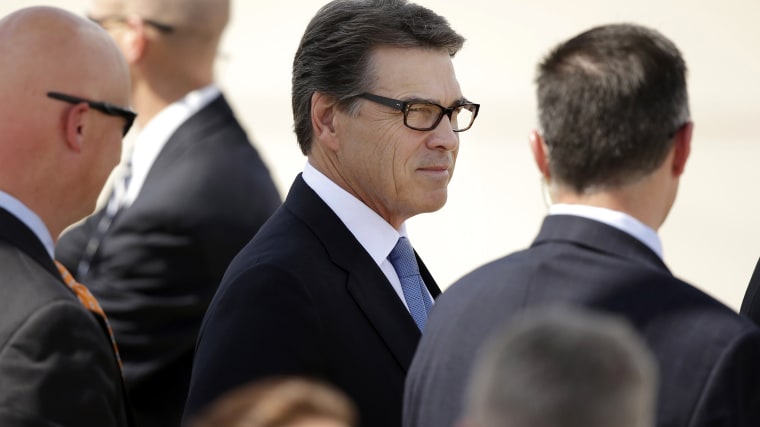Texas Gov. Rick Perry (R) recently appeared on Fox News, stressing his support for deploying National Guard troops to address the humanitarian crisis at the Southern border. Brit Hume asked the governor to explain what the Guard would actually do. Perry
struggled to explain.
Hume reminded Perry, "[I]f these children who've undergone these harrowing journeys, to escape the most desperate conditions in their home countries, have gotten this far, are they really going to be deterred by the presence of troops along the border who won't shoot them and can't arrest them?"
At this point, Perry changed the subject.
But that was last week. This week, the Republican governor and likely presidential candidate is
moving forward with his idea, whether he can explain its merits or not.
Republican Gov. Rick Perry on Monday requested the immediate deployment of as many as 1,000 service members to assist with security at the U.S.-Mexico border. The soldiers, from both the Texas National Guard and State Guard, will mobilize throughout the next 30 days to carry out "Operation Strong Safety" along the border region. "I will not stand idly by while our citizens are under assault," Perry said Monday during a press conference.
First, there's very little to suggest Texans are "under assault." Second, "Operation Strong Safety" is an unintentionally amusing phrase. As Paul Waldman
joked, "'Operation Strong Safety'? Why not just go ahead and call it Operation America Macho TestosteReagan?"
But even putting that aside, at its core, the most meaningful concern here is that Perry's solution doesn't match the problem.
The obvious question in response to the announcement from the governor's office is simple: what, exactly, does Perry expect the Guard to do?
Part of the rationale, he said yesterday, was to deter others from entering the United States illegally. Again, this is predicated on a mistaken assumption about the nature of the crisis itself. These unaccompanied children are not sneaking into the country -- on the contrary, they're walking up to law-enforcement officials and gladly turning themselves in.
There is no deterrent effect in having more law-enforcement personnel because the kids aren't afraid of getting caught. They fully expect to be taken into custody; they want to be taken into custody. Does Perry not understand these details? If not, why not?
What's more, Greg Sargent
recently talked to the head of the National Guard under the Bush/Cheney administration, who offered a valuable perspective.
[I]n an interview today, the head of the National Guard under George W. Bush said he had not yet heard a clear rationale for sending in the Guard and suggested it might not be the appropriate response to the problems at the core of the current crisis, though he did say he could envision the Guard playing some sort of part in a broader solution. "Until mission requirements are clearly defined, it can't be determined whether this is an appropriate use of the Guard in this particular case," H. Steven Blum, who was the Chief of the National Guard Bureau from 2003 to 2009 and has been a career military man for decades, told me. "There may be many other organizations that might more appropriately be called upon. If you're talking about search and rescue, maintaining the rule of law or restoring conditions back to normal after a natural disaster or a catastrophe, the Guard is superbly suited to that. I'm not so sure that what we're dealing with in scope and causation right now would make it the ideal choice."
That still seems to be an exceedingly polite way of saying, "Republican demands don't seem to make any sense."
Of course, it's possible Perry's decision is less about making sense and more about presidential posturing in advance of a national campaign. Immigration was an albatross for the Texas governor in 2012 -- remember the "
have a heart" problem? -- and the Republican is no doubt eager to chart a different course in advance of 2016. Dispatching the National Guard, in this sense, is about looking "tough" and creating a talking point for the campaign trail, not searching for a practical solution.
It led Rep. Lloyd Doggett (D-Texas) to say in a statement, "Once again, Texas taxpayers are being forced to pay for Governor Perry's grandiose political ambitions. It is a costly misuse of our highly skilled National Guard to demand its service as a mere referral agent for children seeking refuge from abuse. Doing its job effectively, our Border Patrol does not need interference from either Governor Perry or vigilantes. We deserve Texas tough, but today we get only Texas Governor weak -- weak on any bipartisan solutions, weak on any meaningful action."
